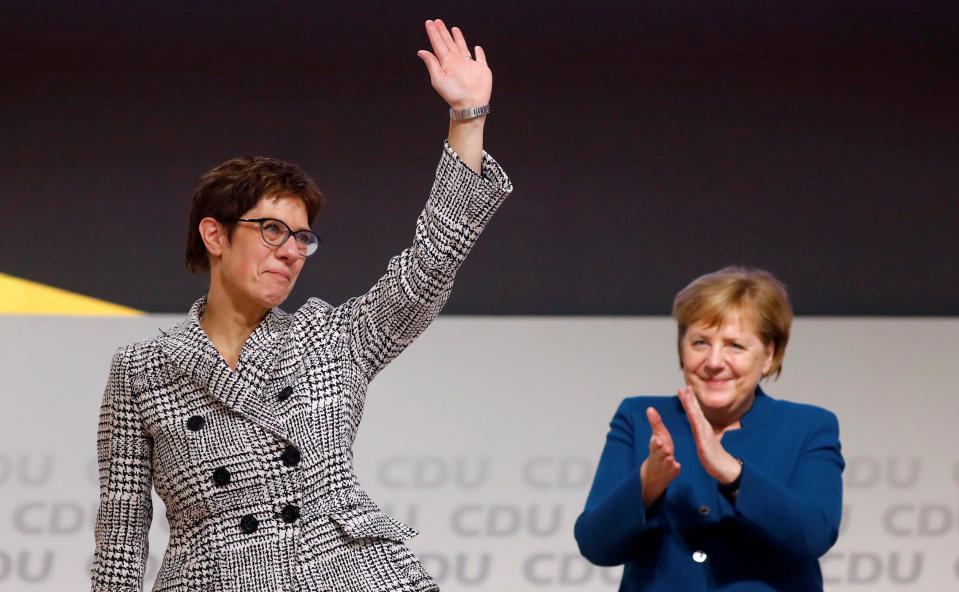Merkel’s protégé can only fix Germany’s ruling party if she doesn’t mirror her mentor

It was a bittersweet day for Angela Merkel on Friday, as she gave her final speech as leader of the Christian Democratic Union (CDU). On one hand, she was stepping down to try and save her party, but on the other, the German chancellor got what she wanted: to pass the baton to her protégé Annegret Kramp-Karrenbauer.
Kramp-Karrenbauer’s slim victory is likely to have provoked sighs of relief in the European Union as it means Merkel looks more likely to see out her final term as the leader of the bloc’s biggest economy. The same could not have been said had Friedrich Merz triumphed. As well as disagreeing with Merkel’s policies and party leadership as too left-leaning, the millionaire businessman had an axe to grind after she ousted him from politics nearly 10 years ago.
The person who heads the CDU is normally expected to become the next chancellor in Germany, but, first, the woman many see as Merkel Mark II has big problems to fix — namely uniting and breathing new life into a divided old party, at the same time as bringing back CDU voters who’ve given up on it.
“‘Can she bring back voters?’ is the million dollar question,” says Emily Mansfield from the Economist Intelligence Unit to Yahoo Finance. The CDU won just 32% in the September 2017 general election, and lost around one million voters to the right-wing Alternative for Germany (AfD).
READ MORE: German conservatives to replace Merkel with Annegret Kramp-Karrenbauer as party head
Despite a concentrated lurch to the right by many in the CDU, who started preaching tougher migration laws in an attempt to lure back people still angry at Merkel’s open-door refugee policy in 2015-2016, the party continued to haemorrhage support. This was especially apparent during the recent state elections of Bavaria and Hesse, to both the Greens and AfD, who scooped 17.5% and 10% respectively in Bavaria. The most recent opinion polls put the CDU between 27% and 30%.
Bringing back those voters might be tough considering, to a large extent, Kramp-Karrenbauer represents continuity. She shares many traits with her powerful mentor, including steadiness, pragmatism, and political acumen (she was state premier of Saarland for years), although she has been trying to subtly set herself apart, calling for stricter migration laws and a tougher response to Russia over its recent aggression against Ukraine.
“She has done her best to distinguish herself from Merkel and enunciate that she has a slightly tougher more conservative position,” says Mansfield.
READ MORE: Merkel backs Macron’s call for a ‘real’ European army
The atmosphere at the party conference today was buzzing and electrified around the leadership vote— it was the first time delegates had gotten to chose their leader in years. However, Carsten Brzeski, Chief Economist at ING Germany is less optimistic about the outcome, and doesn’t see any clear way forward for the CDU in the wake of Kramp-Karrenbauer’s close victory over her more conservative rival Merz.
“I’m afraid this means a continued struggle within the party about the right direction to take,” says Brzeski to Yahoo Finance. “Both candidates had more or less 50 percent, and they are representing two different directions for the party.”
“If we would see the current government fall in the next six-to-nine months, I could see Merz coming back,” Brzeski added. “The earlier it would fall, the higher the chance Merz would run for chancellor candidate for the CDU.”

 Yahoo Finance
Yahoo Finance 